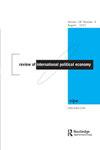主权危机金融中的国际制度复杂性:区域架构的比较
IF 3.7
1区 经济学
Q1 ECONOMICS
引用次数: 1
摘要
本文章由计算机程序翻译,如有差异,请以英文原文为准。
International regime complexity in sovereign crisis finance: a comparison of regional architectures
Abstract The theory of international regime complexity that frames this study specifies expectations for international cooperation stemming from different combinations of hierarchy and differentiation among institutions in regime complexes. This paper compares relationships between regional financial arrangements and the International Monetary Fund in the regional complexes for crisis finance in East Asia, Latin America, and the euro area during 2000-2019 and tests these expectations. Creditor states that sit at the nexus between global and regional institutions are particularly influential in the choice of architecture (the combination of hierarchy and differentiation) for these complexes but are constrained by arrangements inherited from previous decades. Once chosen, the complex’s architecture in turn shapes policy adjustment in borrowing countries and influences whether states pursue regime shifting or competitive regime creation when dissatisfied with institutions. These findings generally coincide with expectations, but exceed the degree of policy adjustment that the core theory expected for the euro area. Interinstitutional collaboration, the dynamics of which are elaborated, fills this explanatory gap. The paper concludes that relations among institutions are essential for understanding the outcomes and evolution of regime complexes and underpin a more complete explanation than provided by singular institutionalism, the power-gap hypothesis and other alternative approaches.
求助全文
通过发布文献求助,成功后即可免费获取论文全文。
去求助
来源期刊
CiteScore
9.20
自引率
9.30%
发文量
47
期刊介绍:
The Review of Political Economy is a peer-reviewed journal welcoming constructive and critical contributions in all areas of political economy, including the Austrian, Behavioral Economics, Feminist Economics, Institutionalist, Marxian, Post Keynesian, and Sraffian traditions. The Review publishes both theoretical and empirical research, and is also open to submissions in methodology, economic history and the history of economic thought that cast light on issues of contemporary relevance in political economy. Comments on articles published in the Review are encouraged.

 求助内容:
求助内容: 应助结果提醒方式:
应助结果提醒方式:


